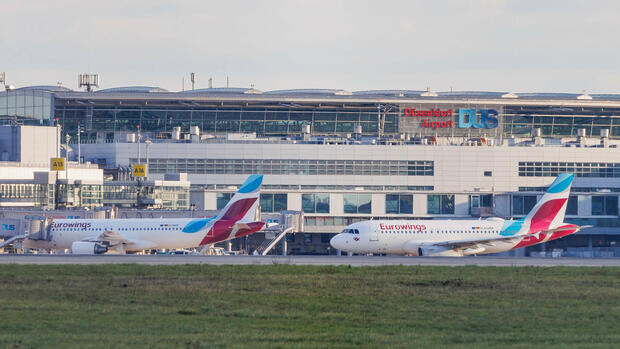The airport operator is no longer demanding a new upper limit for the number of flights. Instead, he wants to distribute traffic more optimally.
(Photo: IMAGO/kolbert-press)
Frankfurt It is likely to be a unique case in the history of German aviation. Düsseldorf Airport has waived the legal authorization to handle significantly more flights. On Friday afternoon, the supervisory board of the operating company recommended changing an ongoing application for planning approval accordingly.
So far, the application submitted in 2015 provided for the current upper capacity limit of 131,000 slots (take-off and landing window) to be dropped in the six busiest months. “Instead, we want to grow smart within the already approved capacity and are shifting the quotas in favor of scheduled and charter traffic,” said airport boss Lars Redeligx to the Handelsblatt.
This means that scheduled and charter flights are given priority. In this way, utilization can be optimized according to demand, said the airport boss. A new operating license for additional slots is not required for this.
The case is proof of how much air traffic in Germany is changing as a result of the pandemic and other factors. The supply is recovering more slowly in this country than in other European countries. According to figures from the Federal Association of the German Aviation Industry (BDL), the number of seats available in Germany last year reached 70 percent of the pre-crisis year 2019. Across Europe, this figure was already 84 percent again.
There is a gap in German domestic traffic. Low-cost airlines such as Easyjet and Ryanair have withdrawn from this market. They probably won’t be coming back any time soon either. The Ryanair management had recently criticized the high fees in this country and described them as a brake on growth.
Eurowings has halved its domestic German offer
At the same time, the market leader Lufthansa has thinned out the domestic German offer. “The Lufthansa Group still makes two percent of its sales with point-to-point traffic within Germany,” said CEO Carsten Spohr last Wednesday. The subsidiary Eurowings only flies half as much within Germany as before the pandemic. This is also politically wanted, according to the will of the traffic light coalition, people should travel more by train.
But for the German airports – most of them in municipal hands – the consequences are sometimes drastic, as is now being shown in Düsseldorf. “The planning approval application was submitted in 2015. Since then, the general conditions have changed,” said Redeligx: “We would also like to have an Easyjet here at the airport, but the so-called low-cost airlines are currently avoiding Germany.” In addition, in 2015 Air Berlin was still operating a hub in Düsseldorf. The airline has now disappeared from the market.
But it’s not just the lack of offers, the increasingly strict requirements imposed by politics are also affecting the airports. Amsterdam Schiphol Airport recently caused a stir in the industry.
The Dutch government had decreed that at one of the largest European airports the number of flights from the current 500,000 per year had to be limited to 460,000 from November. From 2024, a cap of 440,000 should apply. The goal: noise and emissions should be reduced. But after a lawsuit by the Dutch airline KLM, a court overturned these requirements.
>> Read also: US airline Jetblue is expanding in EuropeDüsseldorf Airport is also threatened with tough conditions from the Ministry for the Environment, Nature Conservation and Transport of the State of North Rhine-Westphalia, which is led by Green politician Oliver Krischer. Because according to the previous application, the maximum capacity limit should fall.
“During the process of weighing up the procedure, this could have meant further restrictions on the already very restrictive operating regulations for the airlines based here,” Redeligx explains the situation. But that didn’t help anyone.
Strict conditions for the use of the second lane
Therefore, the airport management is changing. Among other things, they want to use the two lanes more flexibly. The airport may only use the second runway during half of the operating hours. “But we also have to inform the State Ministry of Transport exactly one hour a week in advance when we are going to use the northern runway,” said Redeligx.
Without a certain degree of flexibility, the airport would not be able to react quickly to unforeseen delays, such as bad weather or air traffic controller strikes in Europe. “This leads to unnecessary delays.”
The airlines are currently working flat out to make flight operations more reliable again after the difficult year 2022. In doing so, they hold the airports in particular responsible. “We want to create prospects for the airport, the jobs and the region, while at the same time we want to ensure the right location conditions for our customers, i.e. the airlines,” said Redeligx: “And we want to take the concerns of local residents and the environment into account. “
Ralph Beisel, General Manager of the airport association ADV, expresses understanding for the decision of the airport in Düsseldorf, but warns: “Approval procedures for important site developments must not result in the business model of an airport being adversely affected.” Forward-looking infrastructure projects in Germany need support of policy makers.
More: How Lufthansa forgets its customers in the frenzy of growth.
